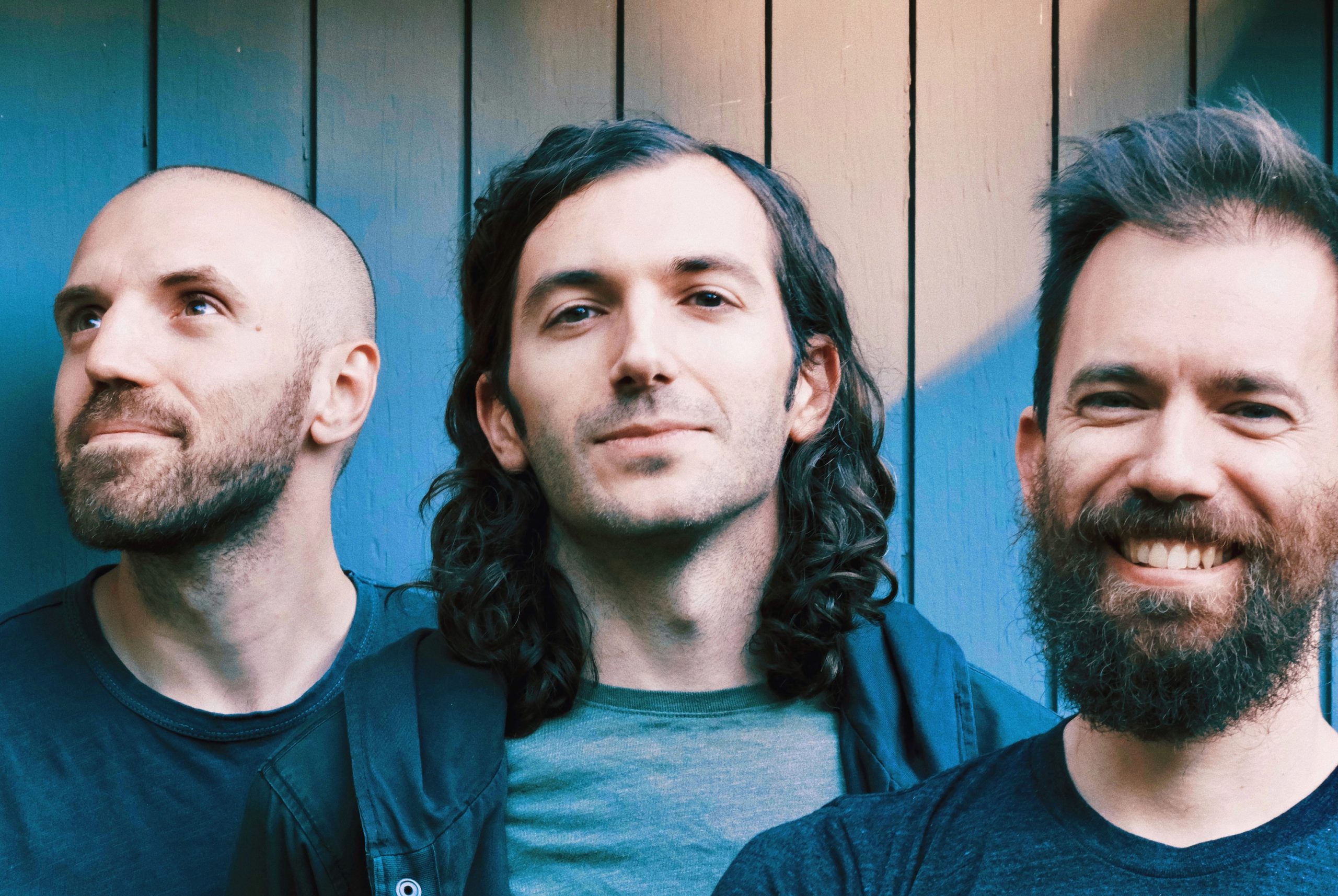July 4th didn't quite live up to our national goal of an "Everybody Back To Normal" holiday, but hopefully you were lucky enough to spend the past weekend reconnecting with the concept of summer life in the Before Times: heading off to the beach, remembering the intoxicating scent of sunscreen and feeling the burning hot sand on your feet, delaying the return back home to sleep in the harsh chill of air conditioning or sweating through the sheets. In other words, living out your typical A Great Big Pile Of Leaves song. Perhaps you've shared the experience described in the chorus of "Beat Up Shoes," the lead single from their long-gestating third album Pono -- "Dropping in off the roof/ Spending all the night head out of the window." There's plenty more where that came from on Pono. Summer, much like A Great Big Pile Of Leaves, is more or less exactly how you remember it.
The official word on Pono will be that it took A Great Big Pile Of Leaves eight years to finish. That's actually a compromise between two plausible truths: It's been in the works for over a decade, as frontman Pete Weiland admits that some of the riffs, melodies, and other songwriting nuggets predate 2013's You're Always On My Mind. It's also possible to say that Pono actually took a month to complete. For that, we can thank Weiland's wife, who gave him a deadline of New Year's Eve 2020 to put the album to rest. "And she said that in the beginning of December. That was just the push I needed."
It's a wildly inefficient workflow that nonetheless suits the temperament of AGBPOL -- this is meticulous, sophisticated music about living as casually as possible. Some of their most beloved songs have titles like "Snack Attack," "Pet Mouse," and "Back To School," which are about the exact things they promise: trying to find something to eat late at night, making friends with a pest that won't leave the apartment, and trying to get as many pool parties in before the semester starts again. The subject matter of Pono doesn't stray far from Weiland's wheelhouse: There are songs about eating water ice and ice cream, watching soap operas, wearing flip flops and pajamas, and the creative impact of writing and cooking utensils ("Kitchen Concert" can be taken literally). But there's an inevitable, newfound urgency to Pono as people continue to adjust to a summer where the most basic social interactions still feel like the most exciting shit imaginable. Weiland compares his past 18 months to Lost's "The Constant" episode -- "The character is stuck on an island and flashing back and forth between the island where he's stuck and the place that's most meaningful to him with the people that are most meaningful to him," Weiland explains. "So that's kind of what the whole year felt like to me in a way. It glorified a lot of memories, getting you to miss some of the things that you didn't even like when you were there."
There are dozens of shadow Ponos floating around on Weiland's hard drive, filled with alternate lyrics, one-off experiments and demos where the songs are mostly intact, albeit with GarageBand's mechanized drummers holding down the beat. "I usually pick the rap [drummer]," Weiland jokes. "That's my future side project that probably will never happen, but I would like to make rap beats one day." The actualized version of Pono solidifies the endearing template Weiland, drummer Tyler Soucy, and Tucker Yaro set on their previous two albums -- Weiland's slow and low vocals accounting for the shouldering and shrugging off of life's demands over frisky, off-kilter drums, a version of Dismemberment Plan that successfully followed their muse into dad-rock and dad jokes after Change. While the trio was working on its own timetable after setting up a home studio, they quickly identified their main directive as doing everything possible to deflect the expectations of taking eight years to make an album -- getting rid of any overdub or arrangement that reminded Weiland of being in a crowded Guitar Center. "We tried to really simplify and not overcomplicate any of the parts, so we didn't want to add unnecessary flash anywhere," Weiland notes. "I think that's something that takes time to harness."
The group is once again based in Connecticut, where Weiland and Soucy originally met before moving to New York City. "Back in the MySpace days, we probably put Brooklyn in our profile," Weiland recalls, and they continued to be labeled as a "Brooklyn band" despite having no relation to the chillwave, art-rock, and shitgaze that typified the borough's last days of indie rock hegemony in the late 2000s. After recording the first AGBPOL EPs in a bedroom without an electric guitar, they humbly worked their way through basement gigs and showcases to release Have You Seen My Prefrontal Cortex? in 2010 on Topshelf Records (key songs: "Meet Me At The Mall, Bring Your Swim Trunks," "Bring Back Breakfast"). There wasn't much in the way of financial success or critical acclaim, but Weiland remembers one particular show at a church in Rockaway, New Jersey that convinced the band it had something legit. They were surprised that the kids in the crowd knew the lyrics, more so that "even like the parents in the room came up to us [afterwards], saying 'I don't usually like my son's bands, but this is really nice,'" Weiland remembers. "We're like... OK, the moms are into it."
Ten years later, Weiland has entered parenthood himself; both he and his wife work in teaching, and Pete conducted his middle school special education classes remotely during the pandemic while playing stay-at-home dad for their two-year old son Desmond. "Weekends and naptimes are when I got to the crunch of songwriting," he says. Before you ask, the kid is not named after the protagonist from the aforementioned Lost episode, though Weiland admits there may have been some subconscious influence due to his affinity for Henry Ian Cusick's character. It's also worth noting that Pono is not a reference to Neil Young's ill-fated, Toblerone-shaped MP3 player, but a Hawaiian term for "righteousness" that Weiland uses as a nickname for Desmond and first heard in the 1999 Disney film Johnny Tsunami. Desmond has largely dictated his father's listening habits of late -- the soundtrack to Daniel Tiger's Neighborhood is a household favorite, though he's connected with his formative years by revisiting the Tony Hawk Pro Skater soundtracks: "It's a nice mix of music that makes me feel like I'm 14 again, trying to ollie over garbage cans."
Weiland considered taking steps to ensure AGBPOL LP3 wouldn't become a Wrens-like running joke on Twitter, such as releasing an EP or one-off single to break up the silence. But as with many bands who've sustained full-time careers outside of music, A Great Big Pile Of Leaves weren't in a position where they felt compelled to put content out in the world just to sustain their momentum. In fact, Weiland's primary goal for A Great Big Pile Of Leaves is that it can be sustainable without being a job. They'd love to tour, but after the "mad COVID bottleneck" opens up for bands at their level. He's only done a handful of interviews in the band's history and, perhaps ironically, Soucy works as a music publicist.
He's also the one member of the band that keeps an active social media presence, and thus serves as Weiland's gateway to the cult audience that has sustained the hype since 2013. Though Weiland's agnostic towards the "emo" tag, he understands how they've benefited from it and fully aware of why it stuck in the first place. You're Always On My Mind featured guest vocals from Motion City Soundtrack's Justin Pierre, and Weiland identified their run opening for the Appleseed Cast as the one that truly taught them how to be a band. "We used to drive all night and get to the venue hours ahead of time, and we'd all be so tired because we didn't sleep," Weiland says. "Chris [Crisci] was like, 'Guys, what are you doing? You need to post up within an hour outside of the venue, get a good night's sleep and wake up early and leave. After that, driving was safer, we're more well rested, the shows are better, we got along better, everything was better about it."
During the summer of 2013, major publications were starting to run their "emo revival" thinkpieces, and most of them were centered around albums recently released on Topshelf Records -- Have Mercy's The Earth Pushed Back, Crash Of Rhinos' Knots, and the motherlode, The World Is A Beautiful Place And I Am No Longer Afraid To Die's Whenever, If Ever. These all dropped within a month or so of You're Always On My Mind, which sounded nothing like AGBPOL's labelmates. Had it been released on, say, Captured Tracks -- a very feasible possibility given their Brooklyn residence -- it could've been a big hit with Mac DeMarco fans.
Maybe they still could be. Weiland speaks with bemusement on the experience of working with radio consultants who immediately tagged "Beat Up Shoes" as the lead single. "They were really pumped on it, they thought it would do really well in the radio they're working on... alternative or something," Weiland shrugs. "Maybe it has to do with tempo, melody... what does everybody like?" It's a very, very likable song -- never overselling itself, a rare instance where a breakdown of handclaps doesn't feel forced. And if it does somehow break A Great Big Pile Of Leaves onto Spotify playlists, Weiland probably won't notice -- he follows "maybe 50 accounts" on Twitter, and the only ones he can remember off the dome are Rory McIlroy, Thrasher, and his bandmates. "The only decision [about completing the album] was, 'Are you guys still pumped on this project?," Weiland rhetorically states. "The answer was, yes, across the board."

Pono is out 8/13 via Topshelf Records. Pre-order it here.






